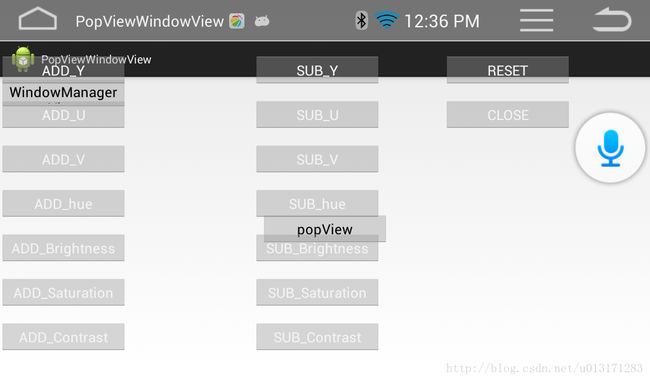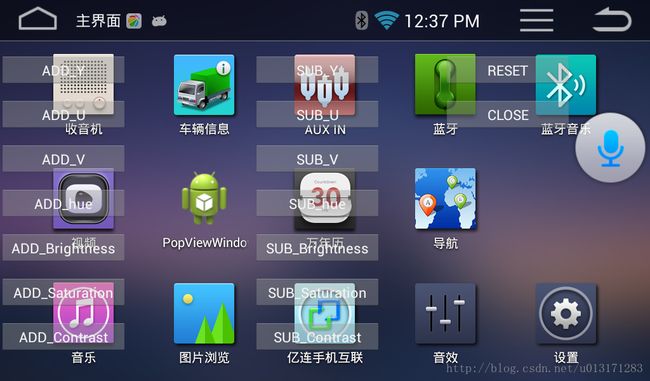android开发PopupWindow和WindowManager的使用
由于本人工作上要写一个调节屏幕参数的界面用到了windowmanager,为避免每次都要去找代码还是自己总结下来好了,有需要的同学自己下载源码,修改一下界面即可。可以用来做类似360,腾讯管家悬浮窗口菜单效果。
这些基本视图的使用在android的APIdemos里面也有,只是没那么详细而已。
SDK APIdemos路径:E:\eclipse_adt_bundlece\sdk\samples\android-19\legacy\ApiDemos\src\com\example\android\apis\view
效果图:



关键代码类:
public class PopWindowTools {
private static PopupWindow popupWindow;
public static void showPopUp(View v, Context ctx) {
LinearLayout layout = new LinearLayout(ctx);
layout.setBackgroundColor(Color.GRAY);
TextView tv = new TextView(ctx);
tv.setLayoutParams(new LayoutParams(LayoutParams.WRAP_CONTENT,
LayoutParams.WRAP_CONTENT));
tv.setText("I'm a pop -----------------------------!");
tv.setTextColor(Color.WHITE);
layout.addView(tv);
popupWindow = new PopupWindow(layout, 120, 120);
popupWindow.setFocusable(true);
popupWindow.setOutsideTouchable(true);
popupWindow.setBackgroundDrawable(new BitmapDrawable());
int[] location = new int[2];
v.getLocationOnScreen(location);
// 上边
popupWindow.showAtLocation(v, Gravity.NO_GRAVITY, location[0],
location[1] - popupWindow.getHeight());
// 下方:
// popupWindow.showAsDropDown(v);
// popupWindow.showAsDropDown(v,200,0);
// 左边
// popupWindow.showAtLocation(v, Gravity.NO_GRAVITY, location[0]
// - popupWindow.getWidth(), location[1]);
// 右边
// popupWindow.showAtLocation(v, Gravity.NO_GRAVITY,
// location[0] + v.getWidth(), location[1]);
}
// LayoutInflater mLayoutInflater = (LayoutInflater) getSystemService(LAYOUT_INFLATER_SERVICE);
// ViewGroup menuView = (ViewGroup) mLayoutInflater.inflate(R.layout.tips, null, true);
// pw = new PopupWindow(menuView, LayoutParams.WRAP_CONTENT,
// LayoutParams.WRAP_CONTENT, true);
// // 设置点击返回键使其消失,且不影响背景,此时setOutsideTouchable函数即使设置为false
// // 点击PopupWindow 外的屏幕,PopupWindow依然会消失;相反,如果不设置BackgroundDrawable
// // 则点击返回键PopupWindow不会消失,同时,即时setOutsideTouchable设置为true
// // 点击PopupWindow 外的屏幕,PopupWindow依然不会消失
// pw.setBackgroundDrawable(new ColorDrawable(Color.TRANSPARENT));
// pw.setOutsideTouchable(false); // 设置是否允许在外点击使其消失,到底有用没?
// pw.setAnimationStyle(R.style.PopupAnimation); // 设置动画
//
// // 计算x轴方向的偏移量,使得PopupWindow在Title的正下方显示,此处的单位是pixels
// int xoffInPixels =
// ScreenTools.getInstance(PopDemoActivity.this).getWidth() / 2 -
// titleName.getWidth() / 2;
// // 将pixels转为dip
// int xoffInDip =
// ScreenTools.getInstance(PopDemoActivity.this).px2dip(xoffInPixels);
// pw.showAsDropDown(titleName, -xoffInDip, 0);
// //pw.showAsDropDown(titleName);
// pw.update();
//
// TextView tv = (TextView) menuView.findViewById(R.id.tips_ok);
// tv.setOnClickListener(new View.OnClickListener() {
//
// public void onClick(View v) {
// pw.dismiss();
// }
// });
}/**
* 注意添加使用权限以及这两种使用区分,pop菜单是寄生于activity界面中的,受activity的生命周期影响,而windowmanager是悬浮于activity之上的。
源码点击下载